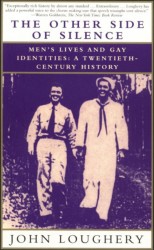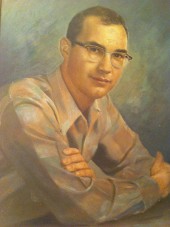 The Other Side of Silence:
The Other Side of Silence:
Men’s Lives & Gay Identities
A twentieth-century history
by John Loughery
Published by Henry Holt and Co.
Published June 15, 1999
Nonfiction: LGBT history
527 pages
Find on Amazon.com: Hardback • Paperback
Review by Billy Glover
November 9, 2007

I want to start making some points about my thoughts on The Other Side of Silence: Men’s Lives & Gay Identities—A Twentieth-Century History, by John Laughery.
It covers a lot. And is readable, which some have not been—such as James Sears’ Behind the Mask of the Mattachine. All of the books are important in our history, but they all cover different parts and from different views.
I think Loughery does a good job, geographically. He “got” that Dorr Legg’s educational work was historic. I don’t think he got that Don Slater’s work was extremely important, as much for his thinking as for his putting out the first public magazine dedicated to homosexual issues.
He mentions picketing or sitting in at the Los Angeles Times, (on 11/05/1969 in protest that the newspaper would not publish the word “homosexual”) which I have not found in the book so don’t know what he is talking about since he does not cover our picketing of the paper.
And once again he implies that Troy Perry’s work elsewhere, including ad in The Advocate, got his church really gong. Nonsense. Anyone knows that it was the interview he got with John Dart the day he and we picketed the paper, a column which was reprinted all over the nation.

Equally he refers to the draft/military issue but does not give Don Slater credit for (or Harry Hay, John Burnside, Vern Bullough, et al.) for the Motorcade, a historic first.
And the few errors I found were unimportant and geographical. He says Morris Kight was at TCU in San Antonio, and I never heard of them having a branch, so I assume he means Texas Christian in Fort Worth. Unimportant. And he misplaces Kessler first in Alabama but then says it is in Biloxi MS, which it is. Again, unimportant.
But to say that Dorr Legg was the main financial backer of ONE is nonsense. Dorr and Don and then Jim Kepner did wonders for ONE, Incorporated, but none of them had money. And that is why it was so ironic that the moment Reed Erickson came along and guaranteed us money with ISHR that, after Don and I were paid a month or two by ISHR (a point Dorr later used against Don, being deceitful of course), we separated due to internal disagreements which the money should have solved, as Jim Schneider et al. have said.
More later, but he, like Vern Bullough, says things that are very true and shows insight in the overall picture. I think, for instance, in Vern’s case, he alone made the point that I think is true now but didn’t the, that I was the straw that broke the camel’s back and got Don to separate from ONE. That point I think he makes in his introduction and is not made any where else in print.
I now think the booklet Joe Hansen, A Few Doors West of Hope, did—Joe is also never mentioned in the book—is also important.

